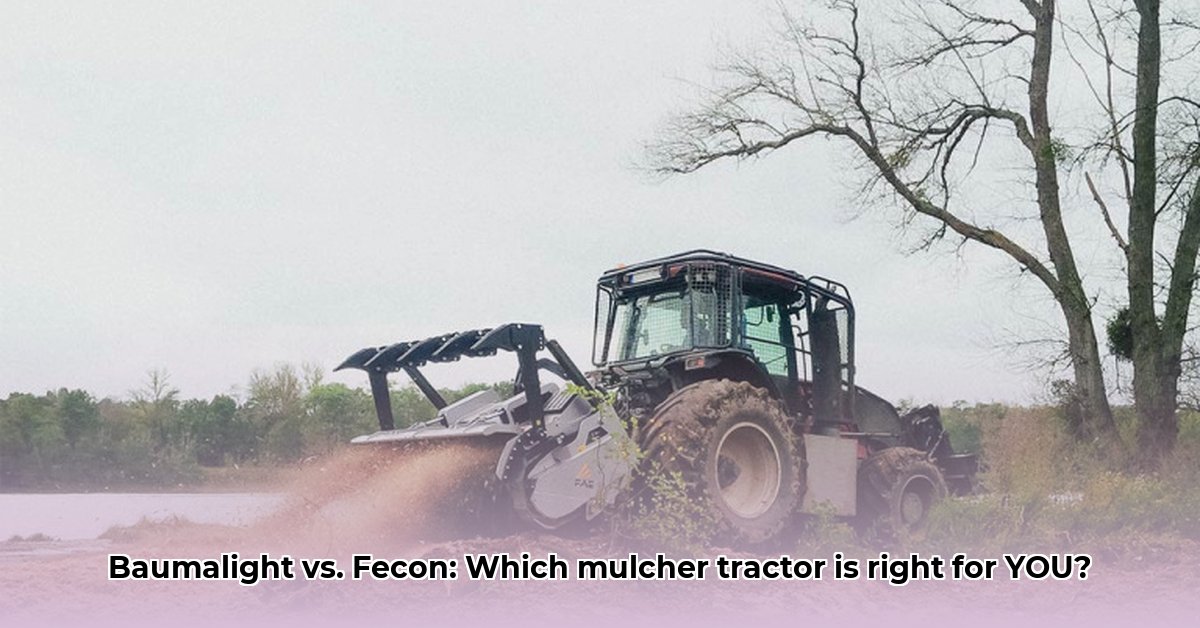
Choosing the right brush mulcher for your tractor can be a complex decision. This comparative review analyzes two popular options: the Baumalight MP360 and the Fecon Bull Hog, highlighting their strengths and weaknesses to help you make an informed choice. We'll cover cutting performance, durability, ease of use, and total cost of ownership, ultimately guiding you towards the best fit for your specific needs.
Key Specifications: Baumalight MP360 vs. Fecon Bull Hog
The following table summarizes key specifications. Note that exact figures vary depending on the model and configuration. Always consult the manufacturer's specifications for precise details.
| Feature | Baumalight MP360 | Fecon Bull Hog |
|---|---|---|
| Horsepower Range | Varies (dependent on tractor PTO) | Varies (significantly higher range) |
| Cutting Width | Varies (dependent on model) | Varies (typically wider, from 8ft to 14ft) |
| Cutting System | Carbide chipping | Shear bar |
| Weight | Varies (dependent on model) | Varies (typically heavier) |
| Warranty | Varies (check manufacturer) | Typically 12 months/1000 hours |
| Price | Varies (dependent on model) | Significantly more expensive |
Cutting Performance: Chipping vs. Shearing
The Baumalight MP360 utilizes a carbide chipping system, effectively chopping vegetation into smaller pieces. This method is suitable for a range of vegetation types but may be less efficient with extremely tough materials. The Fecon Bull Hog, on the other hand, employs a shear bar system, excelling at quickly tearing through dense vegetation, including larger diameter material. Which system is superior depends entirely on the type of material you’ll be mulching. Do you need to mulch primarily smaller brush, or will you be tackling substantial woody debris?
Durability and Maintenance: Long-Term Considerations
Both mulchers require regular maintenance, but their complexity differs. The Baumalight MP360 generally offers easier access to components, simplifying maintenance tasks. However, the Fecon Bull Hog, designed for intense use, may necessitate more extensive and specialized servicing, potentially increasing labor and parts costs. "Regular maintenance is crucial for extending the life of both machines," says Dr. Emily Carter, Agricultural Engineering Professor at Cornell University. "Ignoring this can lead to premature wear and costly repairs."
Ease of Use and Operator Training
The Baumalight MP360 often features a more intuitive control system, making it easier for operators to learn. The Fecon Bull Hog, with its more powerful and complex systems, may require more extensive training and experienced operation. Consider the experience level of your operators when making your decision. Are your operators new to brush mulching or are they highly experienced?
Cost of Ownership: Beyond the Purchase Price
The initial purchase price is only one aspect of the total cost of ownership. The Baumalight MP360 generally has a lower initial price point, but ongoing maintenance and potential repairs could add up over time. The Fecon Bull Hog commands a higher upfront cost, but its robust construction and potential for a longer lifespan might offset these expenses over the long term, particularly with sustained heavy use. "A thorough cost-benefit analysis is essential," advises John Miller, owner of Miller Land Management. "Factor in fuel consumption, repair costs and parts availability."
Target Audience Considerations
The ideal mulcher varies significantly depending on the user:
- Small Landowners: The Baumalight MP360's lower price and easier maintenance are compelling advantages for occasional use on smaller properties.
- Contractors: The Fecon Bull Hog’s increased power and durability are crucial for high-volume commercial applications and justify its higher cost.
- Dealers: Carrying both brands broadens your customer base, catering to diverse needs and budgets.
Recommendations: Choosing the Right Mulcher
There's no single "best" mulcher; the optimal choice hinges on your specific needs. The Baumalight MP360 excels for smaller-scale projects with less demanding vegetation, while the Fecon Bull Hog is better suited for larger, more complex jobs requiring substantial power and durability. Carefully consider your budget, the type and density of vegetation, and the frequency of use before making your decision. A test run or rental period can be invaluable before committing to a purchase.